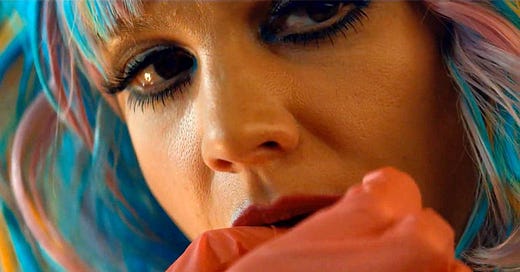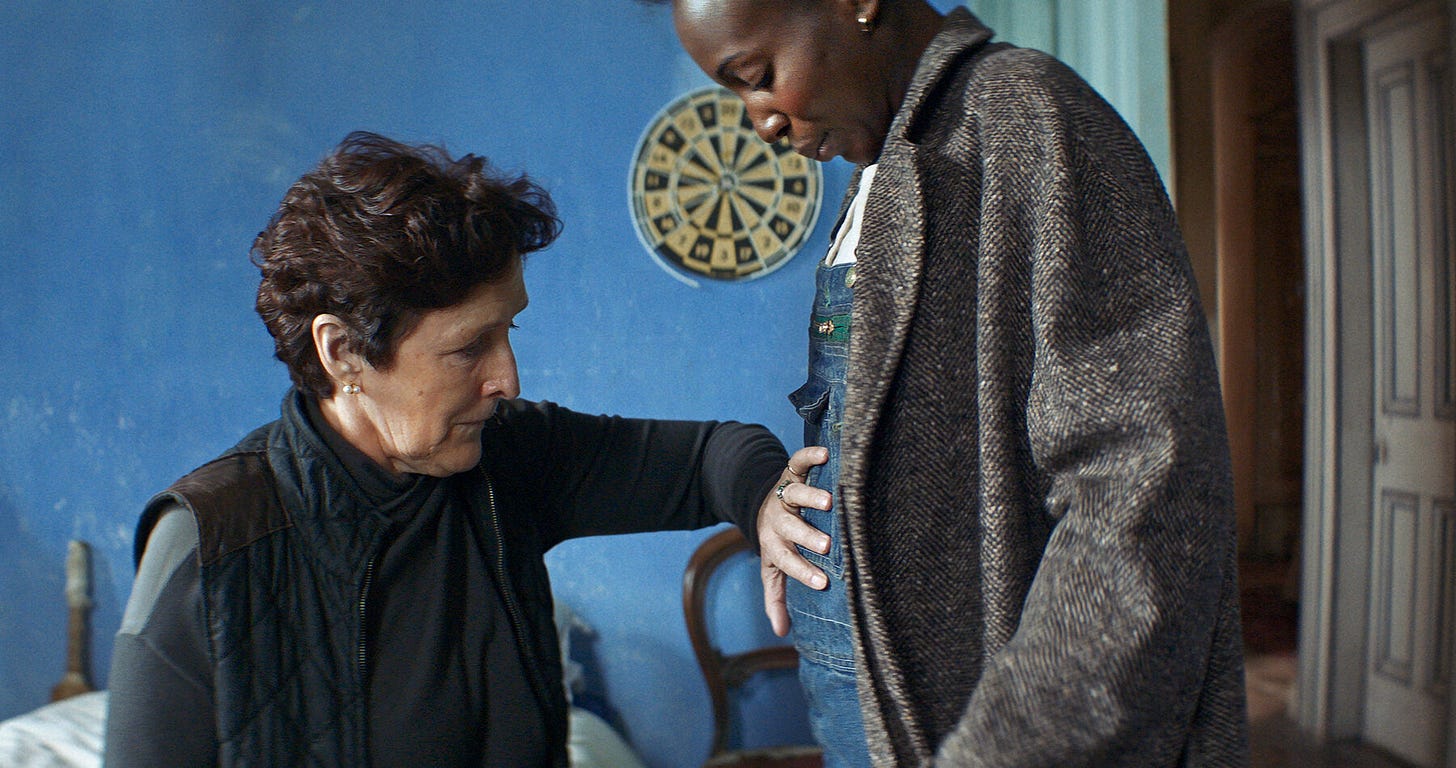This week felt like one long deep breath. Not in a bad way — the first half of the week we sucked air in and waited for Wednesday, and now here we are, on Friday continuing to remind ourselves what it is to truly exhale. There’s work to be done all around, but with 17 executive orders under our belts on Day 1, it feels like maybe we can actually start tackling the hard stuff.
So this week we’re bringing you reviews of two movies that explore some hard stuff. Womanhood is a blessing, but every rose has its thorns: In Promising Young Woman, Zosha explores rape culture and the daily chasm of grief. And in Kindred, Cate looks at the helplessness that comes with a loss of control. It’s a rough week, but we’ll muddle through.
Zosha on Promising Young Woman
The word that popped into my head moments after stopping Promising Young Woman, and has rattled its way into every discussion about the film I’ve had since is: electrifying. To indulge whimsy for a moment, the word carries with it a certain tone in my mind — it’s eLECtriFYing — but in this case it felt darker, like a third rail, a shiver through your spine that loosens a crack you didn’t even know you had. Because lord, what a fucking film.
I should also note that Promising Young Woman is fantastic to go into blind—it’s heady stuff, and you want to be prepared for that, but even knowing the bones of the film from the trailer felt like too much for me. If it were up to me you would stop reading this (or at least just read Cate’s), go watch the film, then come back to discuss. Ye be warned; spoilers abound.
What I love about Promising Young Woman is how the movie is always exactly what it purports to be, and yet indulges our idea of what it might be anyway. It’s a black comedy, about a woman who ensnares would-be assaulters and punishes them accordingly—right up until it’s not. Sure, it’s a “rape revenge” film, but I might put a comma between those, and it’s got a fluffy pink aesthetic—at least, until the point where it isn’t those things.The truth is Promising Young Woman is never those things. It’s not a film about the rage of revenge so much as the misery of it. This is a movie about grief, and how it can swallow your whole life. With expert (and exquisite) care by first-time writer/director Emerald Fennell, Promising Young Woman braids the strands of its story together, weaving them together until they are all choked out by each other.
It is not easy to watch — bone-deep sadness never is. And yet, almost as soon as it was over, I felt another thought rising in my head: I want to watch that again. I am (as friends can attest) not a masochist for these things. But I have a deep appreciation for those who can make something so enthralling, so impeccably constructed, that whatever faults (and, sure PYW has them) a film has feels secondary to its hefty weight on my mind. PYW sits with me, days later, and I feel precious about my thoughts on it, straying away from coverage I was so excited to read. It’s such a gift to get to pick apart a film like this, something that so deeply considers the subject matter of sexual assault without being owned by it.
In the world of Promising Young Woman, sexual assault is a benign threat and an acutely felt one, at all times. Sexual violence is a dialect of the world Cassie (Carey Mulligan with an all-timer) moves through, and she has made herself fluent by necessity. It’s not unfamiliar, but in the hands of Fennell, it’s certainly lit by a harsh glare. To balance the various tones — “rape, revenge,” drama, black comedy, even rom-com at parts — Fennell is surreptitious with information. She doles out what we get to know in drabs, using the time in between to solidify a character study that will pay dividends once the whole picture is revealed. Mulligan is carnivorous in the role, sometimes opaque but always stunningly lived-in.
Again and again the pair teach you what you’re watching. Despite drawing you in with the idea of a glitzy revenge thriller, Cassie’s night life is punctured by sharp needle drops, each more fitting than the last (A slow, thematic cover of “It’s Raining Men” or the piercing violins of “Toxic”). And yet her daily life is all diegetic sound, sometimes even silence. We feel lulled into the idea of an avenging angel only to be confronted with the idea that this is a situation much more common than we care to admit.
As the film shudders into its conclusion, I found myself still doubting the writing on the wall—this despite the numerous violations, cruelties, even reliefs I had been afforded. In the world of Promising Young Woman there is no such thing as a purely happy ending. But maybe that’s the most electrifying thing about it: by refusing to give us the movie we wanted, it gave us a movie far better.
Cate on Kindred
One of the jokes of Black AF, the Netflix retread of Kenya Barris’ series Blackish is that all of the episode titles posit that every issue black people currently face is rooted in slavery. For the show’s purpose, it’s a tongue in cheek reference to the racial self-consciousness of the shows’ protagonist. For the purposes of Kindred, it serves as a reminder that the tentacles of historical racial trauma are never far enough from the present day.
In Kindred, Charlotte (Tamara Lawrance) is drawn into a malicious web of gaslighting and deceit when her loving boyfriend Ben (Edward Holcroft) dies suddenly in a freak accident during a visit to his mother’s decaying estate. Newly and reluctantly pregnant, Charlotte tries to continue her pursuit of the life they had planned to build together, only to find herself thwarted at every turn by Ben’s mother Margaret (Fiona Shaw) and her enterprising stepson Thomas (Jack Lowden).
The intrusions begin mildly enough—the pair takes over the arrangements of Ben’s funeral and organize his effects. But things quickly ratchet into disquiet and terror as Margaret sells the cottage Charlotte and Ben lived in together out from under her, leaving her with no place else to go.
It soon becomes clear that the subject of Margaret’s fixation is Charlotte’s pregnancy. Controlling and rigid in her sons’ youth, Margaret was initially apoplectic at the prospect of the young couple’s plans to move to Australia, and take her grandchild with them. Now, with Ben gone and Charlotte helpless, she imposes her will so firmly that Charlotte is left fighting for her life.
Kindred was terrifying to watch because it was marked not by force or physical violence but continued and unending gaslighting. Charlotte had never wanted children, sensitive to her own mother’s debilitating postpartum psychosis. Margaret uses this trepidation against her, insisting that Charlotte is not well, cannot take care of herself, and must be forced to stay in her and Thomas’s care. The two work together to drug and subdue Charlotte, confine her to their sprawling home and ensure that she has no means of escape.
Naturally, Charlotte is resourceful and repeatedly concocts schemes to try to get away. But Margaret, Thomas—and soon it seems, the entire town— are conspiring to keep her imprisoned and on her back foot. A doctor she approaches for a possible abortion, chastises her then confirms Margaret’s lay-diagnosis of insanity. A stable hand she reaches out to for help drives her right back onto the property. Nothing and nowhere is safe for her, an all too apt metaphor for the dangers that black women face in the real world.
Charlotte’s blackness makes the terror of the story all the more visceral. Here she is, a young black mother trying in vain to take control of her own fertility and her life, only to be thwarted again and again by the white people around her who refuse her that right. All the while, she dreams of crows—ominous symbols of death that haunt her. But no matter her efforts, no matter the dangers she endures, no one will help her. In the end, it is the product of her conception— the child she didn’t want but now wishes only to protect—that marks her only value.
The film’s ending was so upsetting that I sobbed. After one last failed escape attempt, Charlotte crashes the getaway car she is driving and wakes up in a hospital, no longer pregnant. Her child was born when she was unconscious and has been delivered into the custody of her jailers. Now, she is imprisoned forever in a mental health facility, lost to time—a newly established statistic, separated from her child. The despair on Charlotte’s face as Thomas took her son away will haunt me forever. As it turns out, the scariest part of Kindred is that it’s all too real.
Assorted Internet Detritus
CATE: Lots to read this week including a remembrance of Samantha Jones, an essay about the problem with “hot for teacher” narratives, a look at the aesthetics of fascism, a note about the best show you didn’t watch (it’s about cheerleaders), a recognition that sports movies are good actually, and my personal favourite, a breakdown of why we’re all into sea shanties right now.
ZOSHA: The unexpected shared world of The Crown and Lover’s Rock. Why you should always choose the tiniest spoon to eat something with. I’ve now watched one (1) whole season of GBBO, so please accept this about how its kindness sets it apart. The ever-changing world of Star Wars figures and dolls. A surprisingly salient and intriguing discussion of why it matters what is film and what is TV.
See you next week!
Settling into a new administration and yelling about movies,
Zosha + Cate <3
Twitter:@30FlirtyFilm
Instagram:@30FlirtyFilm









